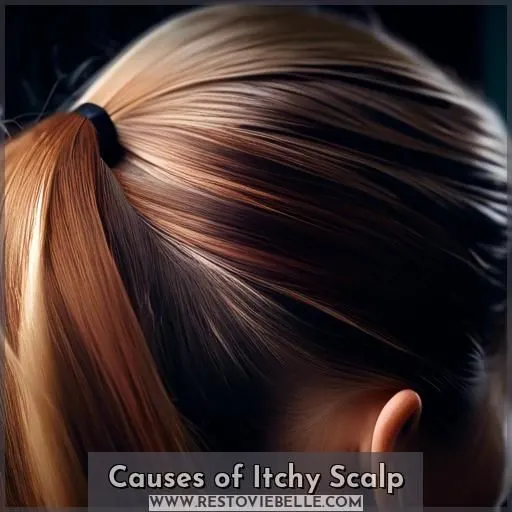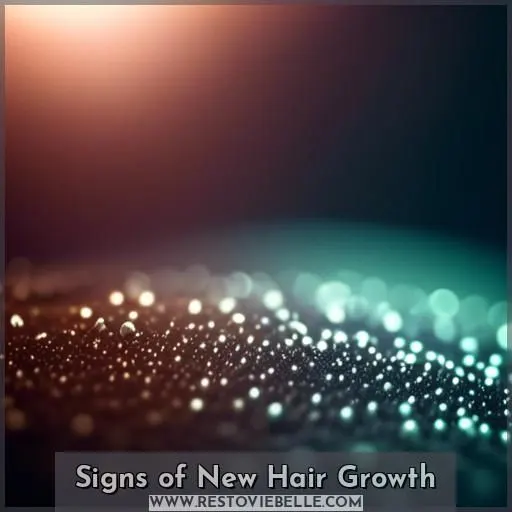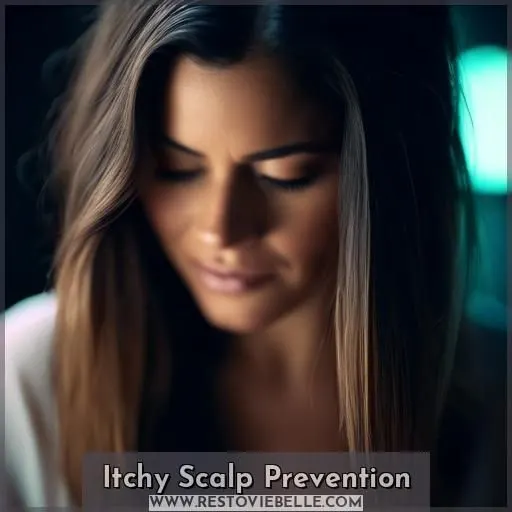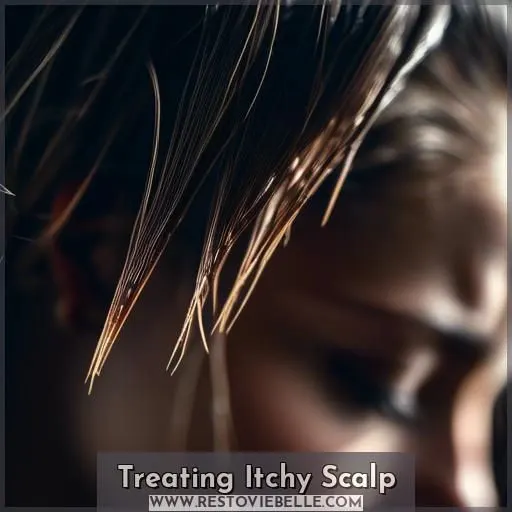This site is supported by our readers. We may earn a commission, at no cost to you, if you purchase through links.
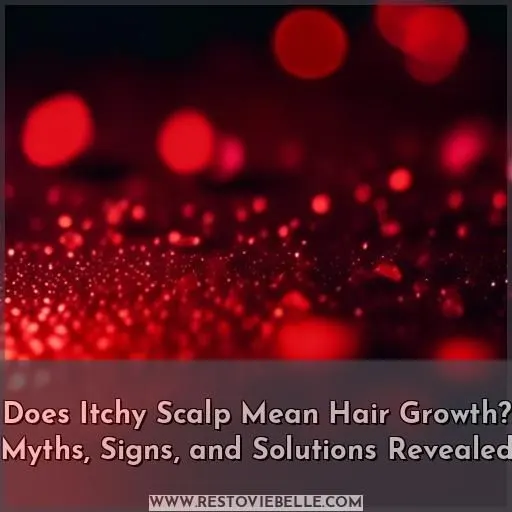
No, an itchy scalp does not necessarily mean your hair is growing. While an itchy scalp can sometimes be a sign of new hair growth, it’s more commonly caused by skin conditions like dandruff, psoriasis, or eczema, as well as side effects from hair loss treatments.
Lifestyle factors like stress and harsh hair products can also trigger scalp irritation. The true signs of new hair growth include decreased visibility of your scalp, the appearance of baby hairs, thicker hair, and a tingling sensation.
To properly treat an itchy scalp, it’s important to identify the underlying cause.
Table Of Contents
Key Takeaways
- An itchy scalp is not a definitive sign of hair growth.
- Skin conditions like dandruff, psoriasis, and eczema, as well as side effects from hair loss treatments, are more common causes of an itchy scalp.
- Lifestyle factors such as stress and harsh hair products can also contribute to scalp irritation.
- To properly treat an itchy scalp, it’s important to identify the underlying cause.
Does Itchy Scalp Mean Hair Growth?
Yes, an itchy scalp can sometimes be a sign of new hair growth, as the sharp, pointed ends of new hair strands can pierce the skin and cause a level of discomfort or itchiness. However, it’s important to distinguish between general scalp discomfort and the specific irritation associated with hair sprouting.
Persistent itching could be indicative of underlying conditions like scalp psoriasis or seborrheic dermatitis.
Common Misconceptions
Let’s tackle the elephant in the room: the itchy scalp and hair growth myth.
You’ve probably heard the old wives’ tale that an itchy scalp is a surefire sign of lush locks sprouting.
But hold your horses!
This notion is more fiction than fact.
An itchy scalp can be a dance floor for dandruff, a battleground for scalp irritation, or a distress signal from hair thinning.
Before you reach for natural remedies, remember, an itchy scalp doesn’t always herald a hairy renaissance.
Causes of Itchy Scalp
You may experience an itchy scalp due to various skin conditions that cause inflammation and flaking:
Seborrheic dermatitis
Psoriasis
Eczema
Additionally, certain hair loss treatments can irritate the scalp and induce itchiness as a side effect:
Those containing minoxidil
Those containing propylene glycol
Lifestyle factors can also contribute to scalp irritation and itchiness:
Using harsh hair products
Not washing your hair regularly
Exposure to extreme temperatures
Skin Conditions
An itchy scalp can be caused by various factors, including skin conditions like dandruff, eczema, and psoriasis.
Dandruff, also known as seborrheic dermatitis, is the most common cause of an itchy scalp. It’s characterized by itching, flaking, redness, and yellow or white scales.
Eczema, a chronic inflammatory condition, can also cause scalp itchiness.
Psoriasis, a chronic inflammatory skin condition, can lead to itchy, scaly patches on the scalp.
Scalp exfoliation and scalp masks can help alleviate some of these symptoms, but it’s essential to consult a healthcare professional for proper diagnosis and treatment.
Hair Loss Treatments
Hair loss treatments like Minoxidil, rosemary oil, and topical Finasteride can cause scalp itchiness. Minoxidil spray contains propylene glycol, a known irritant, but propylene glycol-free Minoxidil foam reduces scalp itchiness. Allergic reactions to hair loss treatment ingredients can also cause itchiness, manifesting as hives, swelling, or a rash.
Lifestyle Factors
Lifestyle factors can greatly affect scalp itchiness and hair growth. Here are three crucial points to mull over:
- Stress Triggers: Elevated stress levels can lead to scalp itching and hair loss. Manage stress through relaxation methods, exercise, or consulting a mental health professional.
- Seasonal Changes: Dehydrated skin and cold weather can cause scalp itching. Keep your hair hydrated and shield your scalp from extreme weather conditions.
- Hair Products and Scalp Sensitivity: Specific hair products can irritate the scalp. Choose natural remedies or products designed for sensitive scalps. Also, be mindful of your scalp’s sensitivity when selecting hair care products.
Signs of New Hair Growth
If you’re noticing less visible scalp, fuzzy baby hairs around your hairline, or thicker, less thinning hair, these could all be positive signs of new hair growth. While an itchy scalp alone doesn’t necessarily mean your hair is growing, these visible changes indicate your follicles are actively producing new strands.
Decreased Visibility of Scalp
When you notice a decreased visibility of your scalp, it could be a sign of new hair growth. This is often accompanied by baby hair, thicker hair, reduced thinning, and little hair shedding.
To encourage this growth, try scalp massages, applying coconut oil or tea tree oil, practicing stress reduction, and maintaining a healthy hair care routine.
Baby Hair
Baby hair, also known as peach fuzz, is a sign of new hair growth. It appears as fine, wispy strands that are delicate in nature and grow quickly. The texture, length, styling, volume, and color of baby hair can vary depending on individual factors.
Some people may experience a tingling sensation on their scalp, which can be accompanied by other signs of growth. While itchy scalp doesn’t necessarily mean hair growth, it can be a sign of underlying conditions that limit growth or cause hair loss.
Proper nutrition, washing hair correctly, and maintaining a balanced diet can support healthy hair regrowth.
Thicker Hair and Reduced Thinning
Thicker hair and reduced thinning are signs of new hair growth. You may notice dark spots on your scalp, soft fuzzy hairs around your hairline, and a tingling scalp. These changes can indicate increased hair density, hair thickness, and growth speed.
However, it’s important to remember that excessive scratching can damage hair follicles. To maintain healthy hair, use anti-dandruff shampoo and maintain a balanced diet.
If you’re concerned about hair loss or severe itchiness, it’s best to consult a healthcare provider.
Itchy Scalp Prevention
Preserving a healthy scalp is essential for fostering hair growth. Cleansing your hair effectively, adhering to a nourishing diet, and implementing a regular hair care regimen can all help alleviate an itchy scalp and create a favorable environment for new hair to thrive.
Washing Hair Correctly
Washing hair properly is paramount for preventing an itchy scalp. Excessive use of dry shampoo can result in product accumulation, potentially inflaming your scalp. Conditioner application should be customized to your hair type, and scalp massage can enhance blood circulation and alleviate itching. Regular hair washing and refraining from harsh styling products can contribute to a healthy scalp.
Diet and Nutrition
To prevent an itchy scalp, focus on maintaining a balanced diet with adequate protein intake. Protein is essential for hair regrowth and strengthening, while nutrient deficiencies can lead to hair loss and scalp irritation. Make sure a balanced diet rich in vitamins and minerals to support hair health.
Hair Care Routine
To prevent itchy scalp and promote healthy hair growth, establish a hair care routine that includes scalp care. Opt for gentle shampoos and conditioners, and avoid harsh chemicals.
Incorporate hair growth supplements, like biotin or saw palmetto, into your routine. Regularly oil your scalp with natural oils like rosemary or jojoba.
Treating Itchy Scalp
If your scalp is itchy, you’ve got options. Medical treatments like medicated shampoos and topical creams can soothe the itch, while natural remedies like tea tree oil and aloe vera may also provide relief.
Medical Treatments
It’s important to consult a healthcare professional for medical treatments when dealing with itchy scalp. Here are some options:
- Topical treatments: Over-the-counter therapies like anti-itch creams and lotions can provide temporary relief.
- Prescription medications: Your doctor may prescribe antihistamines, corticosteroids, or antifungal medications to treat underlying conditions causing itchiness.
- Hair loss treatments: If itchiness is a side effect of hair loss treatments like Minoxidil or Finasteride, your doctor may recommend a propylene glycol-free alternative or adjust your treatment plan.
Natural Remedies
After exploring medical treatments, let’s venture into natural remedies that can soothe your itchy scalp. Imagine pampering your head with a scalp massage using coconut oil, a champion in moisturizing. Or envision a sprinkle of apple cider vinegar, nature’s own disinfectant, working miracles. And don’t overlook tea tree oil, the revered ally against irritation. Your scalp’s rescue squad is here!
When to Consult a Healthcare Provider
If you experience persistent or severe scalp itchiness, or if it’s accompanied by hair loss, it’s best to consult a healthcare provider. They can diagnose any underlying conditions and recommend appropriate treatment to address the root cause of your scalp irritation and support healthy hair growth.
Underlying Conditions
Underlying Scalp Conditions
If you’re experiencing an itchy scalp, it’s imperative to consult a healthcare provider to eliminate any underlying scalp conditions. Some common scalp conditions that can cause itchiness and may be associated with hair growth include:
- Seborrheic Dermatitis: This inflammatory skin condition can cause temporary hair loss due to excessive scratching or an overgrowth of fungus. Once treated, hair will grow back.
- Ringworm: This fungal infection can affect the scalp and cause hair loss. Treatment with antifungal medication can help restore hair growth.
- Lichen Planopilaris: A chronic inflammatory condition that can cause patchy hair loss. Treatment may include topical or systemic corticosteroids, or immunosuppressive medications.
- Hormonal changes: Hormonal imbalances can cause hair loss or affect hair growth. Consult a healthcare provider to discuss potential treatments.
It’s essential to address any underlying scalp conditions to prevent further hair loss and promote healthy hair growth.
Severe Itchiness
If you’re experiencing severe itchiness on your scalp that persists despite home remedies and lifestyle changes, it’s important to consult a healthcare provider. Persistent irritation could be a sign of a more serious scalp disorder**. Don’t ignore it, as ignoring such conditions could lead to complications. A healthcare provider can help diagnose the issue and suggest appropriate treatments.
Hair Loss Concerns
If you’re experiencing itchy skin, dry scalp, or dandruff, it’s crucial to contemplate the potential ramifications of your hair care regimen and products. Scalp irritation can be a typical consequence of specific hair loss treatments, such as Minoxidil, which contains propylene glycol, a recognized irritant.
If you suspect an allergic reaction to hair loss treatment ingredients, consult a healthcare provider promptly. Remember, itchy scalp usually doesn’t deter hair growth but may signify underlying conditions that limit growth or cause hair loss.
Frequently Asked Questions (FAQs)
Can itchy scalp be a sign of hair loss?
While an itchy scalp can sometimes signal underlying conditions that cause hair loss, it doesn’t directly indicate new hair growth. However, scratching the scalp excessively may actually damage hair follicles and inhibit growth. The key is addressing the root cause.
Is itchy scalp a symptom of a skin condition?
An itchy scalp can indeed indicate a skin condition like eczema, psoriasis, or fungal infections. These issues may impact hair growth, so it’s best to see a dermatologist for proper diagnosis and treatment.
How does age affect hair growth?
As the years tick by, your hair growth rate is like a roller coaster – fast and furious in your youth, then it’s like trying to scale a mountain. But don’t fret, aging gracefully is all the rage these days.
What foods promote hair growth?
Hey, listen up! To nourish your luscious locks, focus on protein-rich foods like eggs, nuts, and leafy greens. They’re chock-full of the nutrients that’ll have your hair growing strong and healthy in no time. Dig in!
What are the causes of hair thinning?
Hair thinning can result from a variety of culprits, like stress, aging, medical conditions, or even styling practices. Don’t worry though – with the right care, you can nip it in the bud and regain that luscious mane.
Conclusion
Undeniably, the scalp’s unyielding itch can make you lose your mind, but don’t worry – the key lies in discerning the underlying reason.
Be it a skin condition, hair treatment aftermath, or merely lifestyle choices, discovering the hidden trigger is crucial.
By adhering to a hair-care regimen customized to your requirements and seeking expert assistance when needed, you can say goodbye to that irritating itch and embrace the thick, healthy hair growth you’ve been yearning for.
